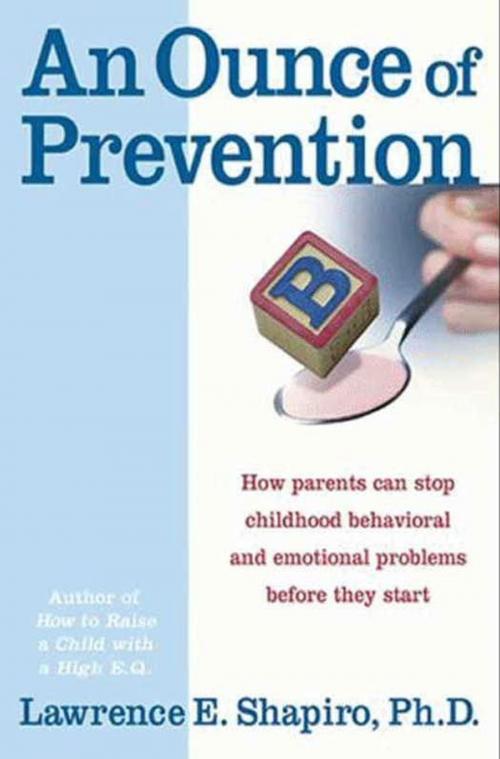An Ounce of Prevention
How to Know When Your Children Will Outg
Nonfiction, Health & Well Being, Psychology, Child & Adolescent, Child Development, Family & Relationships, Parenting| Author: | Dr. Lawrence E. Shapiro PhD | ISBN: | 9780062029546 |
| Publisher: | HarperCollins e-books | Publication: | November 16, 2010 |
| Imprint: | HarperCollins e-books | Language: | English |
| Author: | Dr. Lawrence E. Shapiro PhD |
| ISBN: | 9780062029546 |
| Publisher: | HarperCollins e-books |
| Publication: | November 16, 2010 |
| Imprint: | HarperCollins e-books |
| Language: | English |
Most parents understand the importance of prevention when it comes to the physical health and safety of their children. But what many parents don't realize is that it is also possible to use preventive measures for emotional and behavorial problems. As child psychologist Dr. Lawrence E. Shapiro explains in this provacative new book, parents tend to start paying attention only after actual symptoms begin to develop. Yet many problems can be addressed long before symptoms appear-if parents know just what to look for. Preventing emotional problems is much easier than treating them after they have already become disruptive to a child's life.
In An Ounce of Prevention, Dr.Shapiro presents a variety of imaginative, highly successful strategies for handling the pivotal moments in every child's emotional developmentm, from the infant and toddler years through the grad school and teenage years. He helps you understand whether your child is at risk for specific problems and what you can do to reduce the risk. Dr.Shapiro offers advice for parents on such subjects as depression, underachievement, shyness, eating disorders, fallout from divorce, ADHD, and much more.
Some of the suggestions will seem like common sense. Teaching your child good eating habits from a very young age will prevent eating disorders in adolescence. Helping a shy child make a phone call to a new friend will prevent social alienation in the teen years. But other recommendations may be surprising. Fearful babies should not be coddled if they outgrow their hypersensitivity. Toddlers should not be overly praised if you want them to as strive for success later in childhood. Parents should become more involved in their teenagers' education even when their teens are pulling away.
Filled with wonderful examples and lots of concrete advice, this book presents all the skills you need to hlep your child become more resilient when confronted with many problems that face today's children and teens. Provide "an ounce of prevention" every day. It will make a difference in your child's happines-and yours.
Most parents understand the importance of prevention when it comes to the physical health and safety of their children. But what many parents don't realize is that it is also possible to use preventive measures for emotional and behavorial problems. As child psychologist Dr. Lawrence E. Shapiro explains in this provacative new book, parents tend to start paying attention only after actual symptoms begin to develop. Yet many problems can be addressed long before symptoms appear-if parents know just what to look for. Preventing emotional problems is much easier than treating them after they have already become disruptive to a child's life.
In An Ounce of Prevention, Dr.Shapiro presents a variety of imaginative, highly successful strategies for handling the pivotal moments in every child's emotional developmentm, from the infant and toddler years through the grad school and teenage years. He helps you understand whether your child is at risk for specific problems and what you can do to reduce the risk. Dr.Shapiro offers advice for parents on such subjects as depression, underachievement, shyness, eating disorders, fallout from divorce, ADHD, and much more.
Some of the suggestions will seem like common sense. Teaching your child good eating habits from a very young age will prevent eating disorders in adolescence. Helping a shy child make a phone call to a new friend will prevent social alienation in the teen years. But other recommendations may be surprising. Fearful babies should not be coddled if they outgrow their hypersensitivity. Toddlers should not be overly praised if you want them to as strive for success later in childhood. Parents should become more involved in their teenagers' education even when their teens are pulling away.
Filled with wonderful examples and lots of concrete advice, this book presents all the skills you need to hlep your child become more resilient when confronted with many problems that face today's children and teens. Provide "an ounce of prevention" every day. It will make a difference in your child's happines-and yours.















